Meer Taqui Meer مِیر تقیمِیر
Source(google.com.pk)
Mīr Taqī Mīr), whose takhallus (pen name) was Mir (Urdu: مِیرؔ—Mīr) (sometimes also spelt Meer Taqi Meer), was the leading Urdu poet of the 18th century, and one of the pioneers who gave shape to the Urdu language itself. He was one of the principal poets of the Delhi School of the Urdu ghazal and remains arguably the foremost name in Urdu poetry often remembered as Xudā-e suxan (god of poetry).
Life
The main source of information on Mir's life is his autobiography Zikr-e-Mir, which covers the period from his childhood to the beginnings of his sojourn in Lucknow. However, it is said to conceal more than it reveals, with material that is undated or presented in no chronological sequence. Therefore, many of the 'true details' of Mir's life remain a matter of speculation.
Mir was born in Agra, India (then called Akbarabad and ruled by the Mughals) in August or September 1723. His philosophy of life was formed primarily by his father, a religious man with a large following, whose emphasis on the importance of love and the value of compassion remained with Mir throughout his life and imbued his poetry. Mir's father died while the poet was in his teens. He left Agra for Delhi a few years after his father's death, to finish his education and also to find patrons who offered him financial support (Mir's many patrons and his relationships with them have been described by his translator C. M. Naim).
Some scholars consider two of Mir's masnavis (long narrative poems rhymed in couplets), Mu'amlat-e-ishq (The Stages of Love) and Khwab o khyal-e Mir ("Mir's Vision"), written in the first person, as inspired by Mir's own early love affairs but it is by no means clear how autobiographical these accounts of a poet's passionate love affair and descent into madness are. Especially, as Frances W. Pritchett points out, the austere portrait of Mir from these masnavis must be juxtaposed against the picture drawn by Andalib Shadani, whose inquiry suggests a very different poet, given to unabashed eroticism in his verse
Mir lived much of his life in Mughal Delhi. Kuchha Chelan, in Old Delhi was his address at that time. However, after Ahmad Shah Abdali's sack of Delhi each year starting 1748, he eventually moved to the court of Asaf-ud-Daulah in Lucknow, at the king's invitation. Distressed to witness the plundering of his beloved Delhi, he gave vent to his feelings through some of his couplets.
کیا بود و باش پوچھے ہو پورب کے ساکنو
ہم کو غریب جان کے ہنس ہنس پکار کے
دلّی جو ایک شہر تھا عالم میں انتخاب
رہتے تھے منتخب ہی جہاں روزگار کے
جس کو فلک نے لوٹ کے ویران کر دیا
ہم رہنے والے ہیں اسی اجڑے دیار کے
Mir migrated to Lucknow in 1782 and remained there for the remainder of his life. Though he was given a kind welcome by Asaf-ud-Daulah, he found that he was considered old-fashioned by the courtiers of Lucknow (Mir, in turn, was contemptuous of the new Lucknow poetry, dismissing the poet Jur'at's work as merely 'kissing and cuddling'). Mir's relationships with his patron gradually grew strained, and he eventually severed his connections with the court. In his last years Mir was very isolated. His health failed, and the death of his daughter, son and wife caused him great distress.
He died, of a purgative overdose, on Friday, 21 September 1810. The marker of his burial place was removed in modern times when a railway was built over his grave.
Literary life
His complete works, Kulliaat, consist of six Diwans containing 13,585 couplets, comprising all kinds of poetic forms: ghazal, masnavi, qasida, rubai, mustezaad, satire, etc. Mir's literary reputation is anchored on the ghazals in his Kulliyat-e-Mir, much of them on themes of love. His masnavi Mu'amlat-e-Ishq (The Stages of Love) is one of the greatest known love poems in Urdu literature.
Mir lived at a time when Urdu language and poetry was at a formative stage – and Mir's instinctive aesthetic sense helped him strike a balance between the indigenous expression and new enrichment coming in from Persian imagery and idiom, to constitute the new elite language known as Rekhta or Hindui. Basing his language on his native Hindustani, he leavened it with a sprinkling of Persian diction and phraseology, and created a poetic language at once simple, natural and elegant, which was to guide generations of future poets.
The death of his family members, together with earlier setbacks (including the traumatic stages in Delhi), lend a strong pathos to much of Mir's writing – and indeed Mir is noted for his poetry of pathos and melancholy.
Mir and Mirza Ghalib
Mir's famous contemporary, also an Urdu poet of no inconsiderable repute, was Mirza Rafi Sauda. Mir Taqi Mir was often compared with the later day Urdu poet, Mirza Ghalib. Lovers of Urdu poetry often debate Mir's supremacy over Ghalib or vice versa. It may be noted that Ghalib himself acknowledged, through some of his couplets, that Mir was indeed a genius who deserved respect. Here are two couplets by Mirza Ghalib on this matter.
| “ | Reekhtay kay tumhi ustaad nahi ho Ghalib
Kehte hain agle zamane me koi Mir bhi tha (You are not the only master of Urdu, Ghalib They say there used to be a Mir in the past) |
” |
—Mirza Ghalib
|
||
| “ | Ghalib apna yeh aqeeda hai baqaul-e-Nasikh
Aap bey behrah hai jo muataqid-e-Mir nahi (Ghalib! Its my belief in the words of Nasikh*, He that vows not on Mir, is himself unlearned!) |
” |
—Mirza Ghalib
|
||
Famous couplets
Some of his impeccable couplets are:
| “ | Dikhaai diye yun ke bekhud kiya
Hamen aap se bhi juda kar chale'' (She appeared in such a way that I lost myself And went by taking away my 'self' with her) Looked as if rendered me unconscious away went leaving me separated from me |
” |
| “ | Gor kis dil jale ki hai ye falak
Shola ek subh yaan se uthta hai'' (What heart-sick sufferer's misery is the sky? an Ember rises hence at dawn) |
” |
| “ | Ashk aankh mein kab nahi aata
Lahu aata hai jab nahi aata'' (From my eye, when doesn't a tear fall Blood falls when it doesn't fall) |
” |
| “ | Bekhudi le gai kahaan humko
Der se intezaar hai apna (Where has selflessness taken me I've been waiting for myself for long) |
” |
| “ | Ibtidaa-e-ishq hai rotaa hai kyaa
Aage aage dekhiye hotaa hai kyaa (Its the beginning of Love, why do you wail Just wait and watch how things unveil) |
” |
| “ | Likhte ruqaa, likhe gaye daftar
Shauq ne baat kyaa barhaai hai (Started with a scroll, ended up with a record How pursuit escalated the whole thing) |
” |
| “ | Deedani hai shikastagi dil ki
Kya imaarat ghamon ne dhaai hai (Worth-watching is my heart's crumbling What a citadel have sorrows razed) |
” |
| “ | Baad marne ke meri qabr pe aaya wo 'Mir'
Yaad aai mere Isa ko dawa mere baad'' (O Mir, She came to my grave after i'd died My messiah came to my aid after i'd died) |
” |
| “ | "Mir ke deen-o-mazhab ka poonchte kya ho un nay to kashka khaincha dair mein baitha kab ka tark Islam kiya" What can I tell you about Mir's faith or belief ? A tilak on his forehead in a temple he resides, having abandoned Islam long ago |
” |
Mir Taqi Mir in fiction
Khushwant Singh's famous novel Delhi: A Novel gives very interesting details about the fictional life and adventures of the great poet. His fictional memoirs and confessions, especially those about his illicit relations with elite women, mainly with the wife of the aristocrat Rias Khan who employed him as tutor to teach his children, are not only very entertaining but also provide a lot of insight into his mind and heart.
Major works
- "Nukat-us-Shura" Biographical dictionary of Urdu poets of his time, written in Persian
- "Faiz-e-Mir" Collection of five stories about sufis & faqirs, said to have been written for the education of his son Mir Faiz Ali.
- "Zikr-e-Mir" Autobiography written in Persian language.
- "Kulliyat-e-Farsi" Collection of poems in Persian language
- "Kulliyat-e-Mir" Collection of Urdu poetry consisting of six diwans (volumes).
Poetry
by Meer Taqi Meer
Aata
hai Dil mein haal e bad apna bhala kahon
Phir aap hi aap sonch kay kehta hon kia kahon
Parwana phir na Shama ki khatir jala karay
Gar bazm mein yeh apna tara majra kahon
Mat kar kharam sar peh utha lay ga khalq ko
Baitha agar gali mein tera naqsh e pa kahon
Dil aur dedah bais iza o noor e ain
Kis kay tain bura kaho kis ko bhala kahon
Aaway samoom jaye saba bagh say sada
Gar shama apnay soz e jigar ka mein ja kahon
Jata hon meer dasht e janon ko mein ab yeh keh
Majnon kaheen milay to teri bhi dua kahon
*********************
Sikwa karon mein kab tak us apnay meharban ka
Al-qissa raftah raftah dushman hua hai jan ka
Ya Roye ya Rulaye, apni to yun hi guzri
kia zikar hum safeeran, yanan e shadman ka
*********************
Sach kuch nahi rakha hai yeh aankhon ki seep mein
Dekha hai mein nay aankh say pani nikal kar
*********************
Phirtay hain Meer kha koi poochta nahi
Is Aashiqi mein Izzat sadat bhi gayi.
*********************
SHAM HI SAY BUJHA SA REHTA HAI
DIL HUA HAI CHIRAGH MUFLIS KA
*********************
WO AAYE BAZM MEIN ITNA TO MEER NAY DEKHA
PHIR US KAY BAAD CHIRAGON MEIN ROSHNI NA RAHI.
*********************
Kia kahon tum say mein keh kia hai Ishq
Jan ka rog hai bala hai Ishq
Phir aap hi aap sonch kay kehta hon kia kahon
Parwana phir na Shama ki khatir jala karay
Gar bazm mein yeh apna tara majra kahon
Mat kar kharam sar peh utha lay ga khalq ko
Baitha agar gali mein tera naqsh e pa kahon
Dil aur dedah bais iza o noor e ain
Kis kay tain bura kaho kis ko bhala kahon
Aaway samoom jaye saba bagh say sada
Gar shama apnay soz e jigar ka mein ja kahon
Jata hon meer dasht e janon ko mein ab yeh keh
Majnon kaheen milay to teri bhi dua kahon
*********************
Sikwa karon mein kab tak us apnay meharban ka
Al-qissa raftah raftah dushman hua hai jan ka
Ya Roye ya Rulaye, apni to yun hi guzri
kia zikar hum safeeran, yanan e shadman ka
*********************
Sach kuch nahi rakha hai yeh aankhon ki seep mein
Dekha hai mein nay aankh say pani nikal kar
*********************
Phirtay hain Meer kha koi poochta nahi
Is Aashiqi mein Izzat sadat bhi gayi.
*********************
SHAM HI SAY BUJHA SA REHTA HAI
DIL HUA HAI CHIRAGH MUFLIS KA
*********************
WO AAYE BAZM MEIN ITNA TO MEER NAY DEKHA
PHIR US KAY BAAD CHIRAGON MEIN ROSHNI NA RAHI.
*********************
Kia kahon tum say mein keh kia hai Ishq
Jan ka rog hai bala hai Ishq
Ishq hi ishq hai Jahan dekho
Saray aalam mein bhar raha hai Ishq
Ishq maashooq, ishq aashiq hai
Yani apna hi mutila hai Ishq
Ishq hai tarz o tor Ishqkay tayeen
Kahin bandah kahin khuda hai Ishq
Kon maqsad ko Ishq bin puncha
Aarzu ishq o mada hai Ishq
Koi khuhan nahi Muhabat ka!
To kahe jins e narwa hai Ishq
Meer ji zard hotay jatay hain
Kia kahin tum nay bhi kia hai Ishq
*********************
Hasti apni ahbaab ki si hai
Yeh numaish Sarab ki si hai
Naz ki is kay lab ki kia kehye
Pankhari ik Gulab ki si hai
Bar bar is kay dr peh jata hon
Halat ab aztarab ki si hai
Mein jo bola kah yeh aawaz
Isi khana kharab ki si hai
Meer un Neem Baz aankho mein
Sari masti sharab ki si hai
*********************
Aata hai Dil mein haal e bad apna bhala kahon
Phir aap hi aap sonch kay kehta hon kia kahon
Parwana phir na Shama ki khatir jala karay
Gar bazm mein yeh apna tara majra kahon
Mat kar kharam sar peh utha lay ga khalq ko
Baitha agar gali mein tera naqsh e pa kahon
Dil aur dedah bais iza o noor e ain
Kis kay tain bura kaho kis ko bhala kahon
Aaway samoom jaye saba bagh say sada
Gar shama apnay soz e jigar ka mein ja kahon
Jata hon meer dasht e janon ko mein ab yeh keh
Majnon kaheen milay to teri bhi dua kahon
Meer Taqui Meerمِیر تقیمِیر
 |
| Meer Taqui Meerمِیر تقیمِیر |
 |
| Meer Taqui Meerمِیر تقیمِیر |
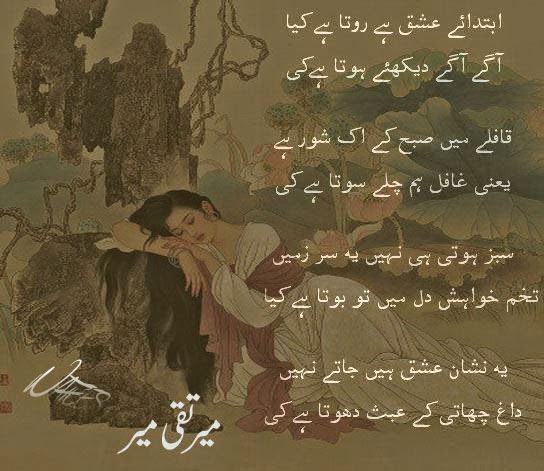 |
| Meer Taqui Meerمِیر تقیمِیر |
 |
| Meer Taqui Meerمِیر تقیمِیر |
 |
| Meer Taqui Meerمِیر تقیمِیر |
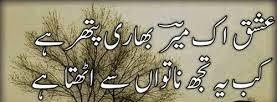 |
| Meer Taqui Meerمِیر تقیمِیر |
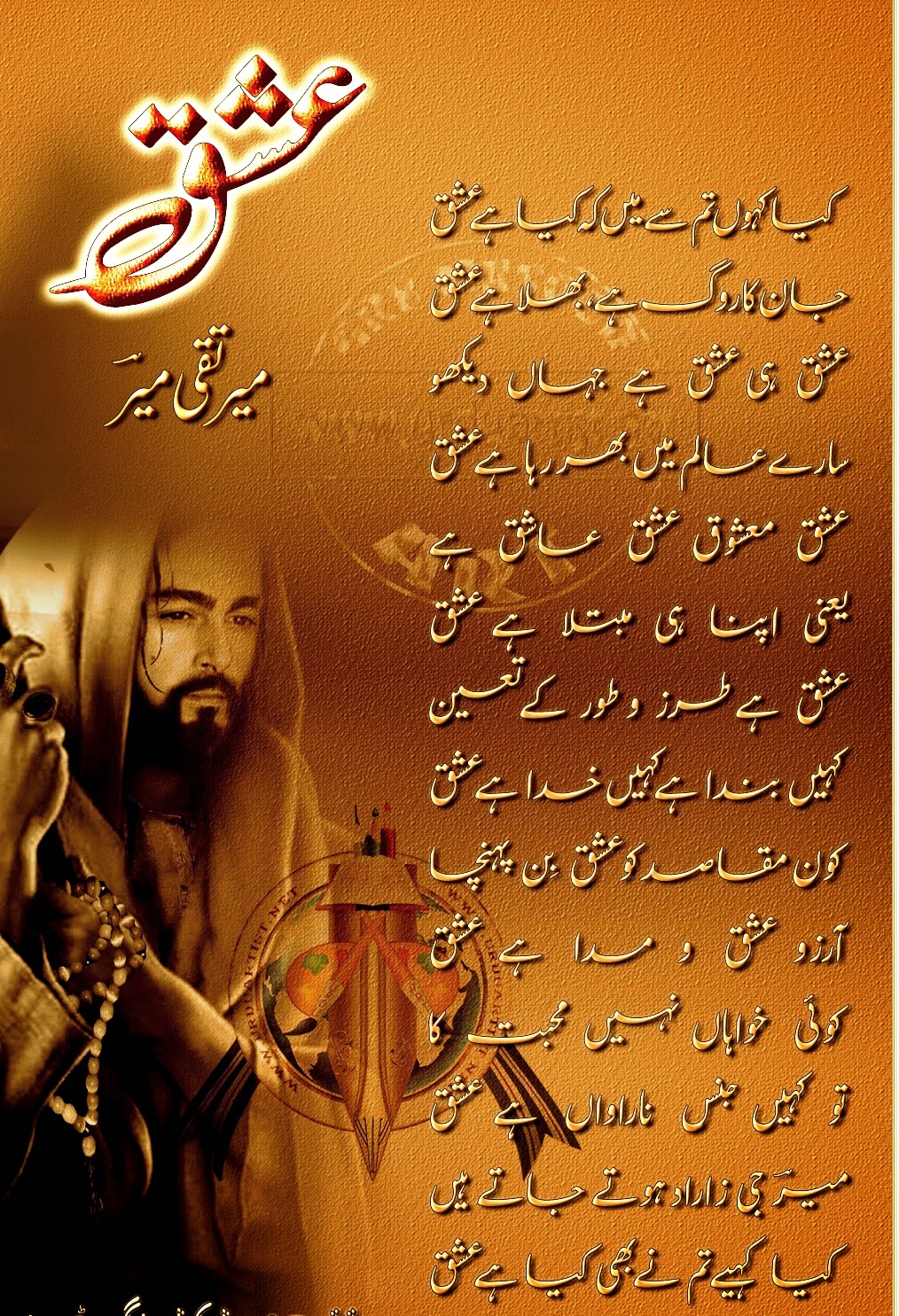 |
| Meer Taqui Meerمِیر تقیمِیر |
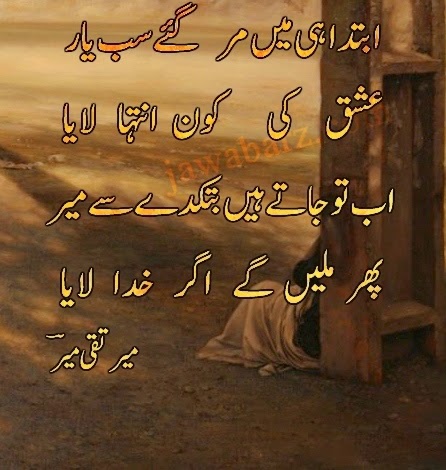 |
| Meer Taqui Meerمِیر تقیمِیر |
 |
| Meer Taqui Meerمِیر تقیمِیر |
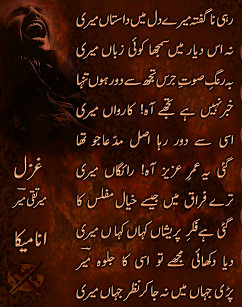 |
| Meer Taqui Meerمِیر تقیمِیر |
No comments:
Post a Comment